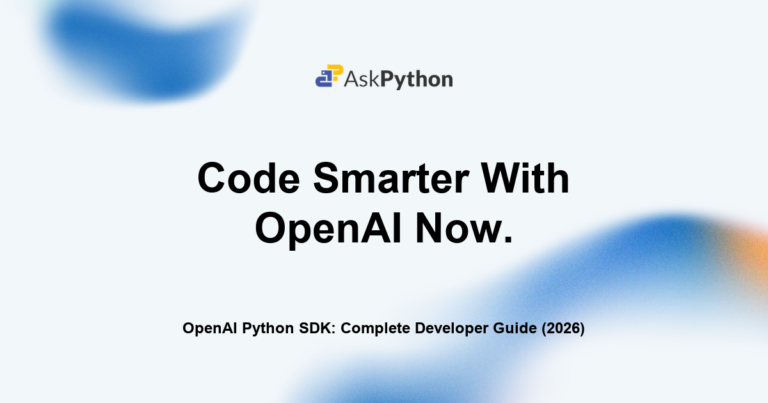Exception handling is a very important part of Python code. Python programming language alerts the programmer of any unexpected situations, this is known as an exception.
Sometimes, there are situations where exceptions go unnoticed and the interpreter provides us a message stating “Exception ignored in”. In this article, we will discuss the reasons behind these messages and get to know when these unexpected situations occur. We will also discuss the best ways to handle exceptions in Python.
The “Exception ignored in” message appears in the traceback when an exception is raised but not handled by the code. It typically occurs in situations where there’s an error in the cleanup code, such as in the __exit__ method of a context manager or during file handling.
Recommended: How to Disable a Warning in Python?
Introduction to Exception Handling in Python
Before we discuss “Exception ignored in” messages, let us discuss how exception handling works in Python. So, when an error occurs, Python produces an exception that interrupts the normal flow of the program. Programmers generally use try-except blocks to catch and handle exceptions thus preventing the program from crashing. Let us look at the code for the same.
try:
result = 10 / 0 # This will raise a ZeroDivisionError
except ZeroDivisionError as e:
print(f"Error: {e}")
In the example above, the ZeroDivisionError is caught, and the program doesn’t crash. Let us look at the output.

Understanding the “Exception ignored in” Message
The “Exception ignored in” messages appear in the traceback when an exception is raised but not handled by the code. It generally occurs in situations where there’s an error in the cleanup code. Let us understand it further with a code.
def divide_numbers(a, b):
try:
result = a / b
print(f"The result of {a} divided by {b} is: {result}")
except ZeroDivisionError as e:
print(f"Error: {e}")
pass # Ignore the ZeroDivisionError
# Example usage
divide_numbers(10, 2)
divide_numbers(5, 0)
divide_numbers(8, 4)
The exception is caught using a ‘try-except’ block in the code above, and the error message is printed. The pass statement is used to ignore the exception which allows the program to continue. Let us look at the output.

Let us now look at another code to get more clarity.
class Resource:
def __enter__(self):
print("Entering resource context")
return self
def __exit__(self, exc_type, exc_value, traceback):
print("Exiting resource context")
try:
# Simulate an error during cleanup
1 / 0
except ZeroDivisionError:
print("Error during cleanup: {}".format(exc_value))
with Resource() as res:
print("Inside resource context")
In the above example, the ‘_ _exit_ _’ method encounters a ZeroDivisionError during cleanup, which gives us the”Exception ignored in” message. The Python program output will give you the exception message in traceback. Let us look at the output.

There are common scenarios for ‘Exception ignored in” messages like file handling. Let us look at an example of this.
Recommended: Python Exception Handling – Try, Except, Finally
with open("nonexistent_file.txt", "r") as file:
content = file.read()
The above code will return a FileNotFoundError resulting in an “Exception ignored in ” message. Let us look at the output.

Best Practices for Handling Exceptions in Python
It is very important to handle exceptions explicitly with try-except blocks to eliminate “Exception ignored in” situations. Ignoring exceptions can resolve any unexpected behaviour from the code.
The ‘finally’ block is meant for cleanup that needs to be executed even though an exception has occurred. This helps us to avoid the “Exception ignored in” message during cleanup. Let us look at a code to understand further.
try:
# Code that may raise exceptions
except SomeException as e:
# Handle the exception
finally:
# Cleanup code that always runs
3. We can also utilize the ‘with’ statement ( context managers ) to manage resources. They ensure proper cleanup and reduce ‘Exception ignored in” scenarios. Let us look at an example.
class CustomResource:
def __enter__(self):
print("Entering resource context")
return self
def __exit__(self, exc_type, exc_value, traceback):
print("Exiting resource context")
with CustomResource() as res:
print("Inside resource context")
Let us look at the output for the same.

Conclusion
There you go! Understanding the “Exception ignored in” message in Python programming language is important for writing good code. In this article, we learned what this message is and how to handle exceptions in the best possible way. Exception handling not only enhances code quality but also contributes to software development as well.
Recommended: Handling Built-in Exception IOError in Python (With Examples)



